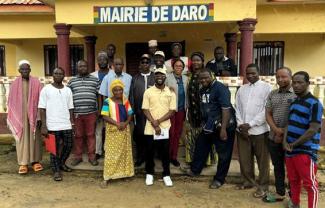The rural commune of Daro is a small town in the prefecture of Macenta in southern Guinea. The main activities of this town are agriculture and livestock. Like most rural communities in Guinea, Daro suffers from widespread poverty and a lack of education which leads to numerous human rights violations, particularly against women and girls.
In October 2023, USAID launched the PROTECT activity to combat trafficking in persons and similar practices in Guinea. At the time the activity began in Daro, lack of schooling and early and forced marriages were endemic, especially among girls, and the community had no knowledge of what human trafficking was.
PROTECT recognized this knowledge as the first line of defense against human trafficking in the community. To achieve this, the activity developed and delivered educational programs targeted at diverse age groups within the community to sensitively educate the residents about the various forms and methods of trafficking. Moreover, they emphasized the significance of reporting suspicious activities and the role of each member of the community in curbing this crime. Aguibou Traore, a farmer in Daro, testified that after participating in several awareness sessions organized by PROTECT about human trafficking and the factors that make individuals and communities vulnerable, community members who seldomly checked on their children living with relatives in big cities now regularly do to make sure their children are treated properly and are pursuing their dreams.
In Daro, the activity has engaged local leaders, such as religious figures, community elders, and educators, who serve as a powerful catalyst for change. As most of the community members are not literate, PROTECT designed an easy-to-understand infographic to generate awareness of what actions could be taken to counter trafficking in persons and empowered the community leaders with these tools to address trafficking within their spheres of influence. The Imam of Daro, Elhadj N'Faly Cherif, testified that forced and early marriages were frequent on the eve of the holy month of Ramadan. But this has changed since they began to preach against these unlawful acts. The activity has also deployed the infographic throughout common community centers, such as the community health post, schools, bars, and tea shops.
These awareness programs have enhanced the overall impact of community engagement initiatives and have shown promising results in the community as testified to by Sekouba Cherif, a chemistry teacher in Kouroussa and native of Daro, “the incidence of school dropouts, early and forced marriages have dropped in our community here since the awareness campaign started almost a year ago”. Whenever he comes home on leave, Cherif always volunteers to support the field agents in their educational talks with the community.
PROTECT collaborates with local governments and law enforcement agencies to strengthen the collective impact.
Mrs. Patricia Marah, the Prefectural Director for Promoting Women, Childhood and Vulnerable Persons in Macenta, advocates for support to equip regional state structures specialized in combating human trafficking in order to reach more people and have a greater impact.
Through public awareness campaigns, forums, workshops, and community events, PROTECT continues to mobilize support for anti-trafficking initiatives and advocate for stronger legislative measures to eradicate this scourge out of Guinea.

Ousmane Condé, USAID Guinea
